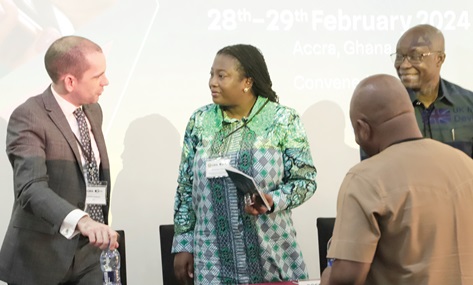
Digital tax implementation chaotic across Africa — Prof. Quartey
While there is a growing appetite for digital taxation across Africa, the erratic and chaotic mode of rollout proves a lack of sufficient evidence to support its implementation, an academic researcher has suggested.
The Director of the Institute of Statistical Social and Economic Research (ISSER), Professor Peter Quartey, said there was a need for effective collaboration between policymakers and academia for an evidence-based approach towards the implementation of digital taxation such as the electronic transfer tax, commonly known as e-levy.
Prof. Quartey made the call in a statement made on his behalf by the Project Director of the Retail Finance Distribution Research Initiative of ISSER, Adazewa Otoo, in Accra at a conference organised by the International Centre for Tax and Development (ICTD), in collaboration with the Ghana Revenue Authority on, “Taxing mobile money — Lessons and the way forward”.
The conference hosted participants from African countries implementing the taxing of mobile money to share insights on taxing mobile money and discuss future directions in the evolving landscape.
Academia’s role
Prof. Quartey emphasised the crucial role of academia in shaping evidence-driven policies for digital taxation across Africa. He highlighted the current challenges in the rollout of digital taxation and stressed the need for collaboration between policymakers and academia.
He underlined the importance of academia in providing immediate data or alternative advice where there was a lack of primary data and called for active collaboration to ensure that the implementation of digital taxation was evidence-based.
Prof. Quartey observed the uniqueness of digital taxation in Africa, highlighting its integral role in the economic development of many African countries.
Significant milestone
The ICTD Research Director and DIGITAX Programme Lead, Martin Hearson, applauded Ghana for its progressive stance on digital financial services taxation, saying it marked a significant milestone in the evolution of the country's economic landscape.
Mr Hearson emphasised the importance of informed debate as Ghana generated over GH¢1 billion in revenue annually from digital financial services taxation. He said contrary to initial concerns about potential setbacks in the mobile money market, ICTD’s research indicated that the impact of the tax was modest and temporary.
He said the growth in mobile money usage had persisted, dispelling worries about long-term implications. Delving into the impact on individuals, Mr Hearson said the ICTD’s findings revealed that while the tax affected the poor more, it stood among the more progressive taxes across Africa.
“The GH¢100 per day exemption threshold emerges as a crucial factor in protecting vulnerable segments of the population,” he said.
Threshold revision
However, he raised an essential concern about revising the threshold in line with inflation, urging the government to consider further research for ongoing effectiveness. With 15 African countries introducing digital financial service taxation, Mr Hearson hailed it as a strategic investment in the continent's economic future and a recognition of the pivotal role digitalization plays in fostering financial inclusion and positioning Africa in the global market.
Mr Hearson emphasised the need for ongoing research to navigate the rapidly evolving landscape.
Ghana's success
The Deputy Commissioner of the Strategy, Research, Policy and Programmes Department of the Ghana Revenue Authority (GRA), Dr Charles Addae, said the e-levy, introduced in May 2022, faced challenges during its implementation leading to a revision of the revenue target during the Mid-Year Budget Review in 2022.
Despite the obstacles, he said the relevant agencies collected revenue that exceeded the revised target by GH¢1.34 million at the end of the year. “In 2023, the GRA successfully collected GH¢1.19 billion from the e-levy, surpassing the set target of GH¢1.11 billion,” he said.
The Deputy Commissioner attributed the success to various factors, including technological advancements, improved filing and payment processes, educational initiatives and a reduction in the levy rate from 1.5 per cent to 1.0 per cent.
Too many taxes
The West African Regional tax adviser of the Foreign Commonwealth Development Office (FCDO), Eileen Rafferty, stated the need for cross-country collaboration, stressing the importance of working closely with revenue authorities and ministries to produce impactful results in various countries.
The Accra City Coordinator of a global network of Women in Informal Employment Globalising and Organising, Dorcas Ansah, was of the view that the e-levy must be scrapped because “there are too many taxes”.
